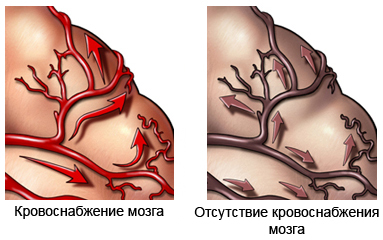Sosudistaya dementia
Description of vascular dementia
Vascular dementia is the cause of dementia. It is called the disease of small blood vessels in the brain. Part of the brain, called white matter (in the same way as podkorkovoe grey matter) damaged numerous microscopic strokes.

Causes of vascular dementia
Vascular dementia occurs, When the cells beneath the surface of the brain (bark), insufficiently supplied with oxygen and nutrients and die. This process is due to blockage of blood vessels in the white matter of the brain, What affects blood supply. As a result,, oxygen and nutrients do not reach the neurons and other cells.
The exact cause of the disease is unknown. Nonetheless, factors, that play a role in causing the disease include:
- High blood pressure (and, probably, too low blood pressure, that is insufficient for proper blood supply to the brain);
- Cardiovascular diseases;
- Blockage of blood vessels (atherosclerosis and lipogialinoz);
- Diabetes;
- Smoking.
Risk factors
Factors, that increase the likelihood of vascular dementia:
- Age: usually a disease of the elderly;
- Alzheimer's Disease – may occur together with vascular dementia;
- High blood pressure (most closely associated with disease risk-factor);
- Cardiovascular disease;
- Blockage of blood vessels (atherosclerosis and lipogialinoz);
- Diabetes
- Smoking
- Disease, which cause blood clotting;
- Genetic disorders.
Symptoms of vascular dementia
In some patients the symptoms appear suddenly, as neurological changes, caused by stroke. Sometimes small strokes, that lead to vascular dementia can occur without other symptoms. This makes the disease hard to discoverable.
In some cases, symptoms may stabilize or even improve. Nonetheless, most patients, the disease continues to progress.
The main symptoms of vascular dementia include:
- Sharp start (some, but not all patients);
- Progressive deterioration of intellectual abilities, the speed of information processing, cognitive and motor abilities;
- Progressive memory loss;
- Slow, unstable gait;
- An abrupt change of direction (some patients);
- Focal neurological symptoms.
Other symptoms, that may arise include:
- Incontinence;
- Wanton laughter, cry, fun;
- Difficulty pronouncing words;
- Difficulty swallowing;
- Paralysis or weakness of one (or both) hand (of the parties) body;
- Apathy (loss of interest in activities);
- Inactivity;
- Depression;
- Symptoms, similar to Parkinson's disease (eg, tremor, incoordination, loss of mobility);
- Convulsions;
- Paranoia;
- Disorientation.
Diagnosis of vascular dementia
Symptoms of vascular dementia can resemble other types of dementia, such as Alzheimer's disease.
The doctor asks about the symptoms and medical history, performs a physical exam. Tests may include the following:
- MRT – test, which uses magnetic waves, to make pictures of the brain;
- CT scan – such as X-ray examination, wherein the computer is used, to take pictures of the brain;
- Single photon emission computed tomography (SPECT);
- At testing;
- Ultrasound of the carotid arteries;
- Echocardiogram – test, which uses high-frequency sound waves, to determine the size of the, shape and motion of the heart, to verify the causes of strokes;
- Electrocardiogram (ECG) – test, that records heart activity by measuring electrical current, passing through the heart muscle; to verify the causes of strokes;
- Blood test, to check for problems with the winding down of the blood;
- Electroencephalogram (EEG) – test for abnormalities in the structure of the brain waves.
Treatment of vascular dementia
There is no method of treatment of vascular dementia. Reducing risk factors and symptom relief may slow disease progression and improve quality of life.
Medicines can be assigned, to limit or control the symptoms and reduce the progression of the disease. These include:
- Medicines that control:
- High blood pressure;
- Cardiac arrhythmia;
- Reduce the risk of stroke (eg, aspirin);
- Increased cholesterol;
- Disease, that cause blood clotting;
- Antidepressants;
- Nimodipine – can improve cognitive function in the short term (There is no evidence to support long-term use of medications);
- Drugs, applied for the treatment of Alzheimer's disease, eg, Donepezil and memantine.
Prevention of vascular dementia
There are no precise guidelines for the prevention of vascular dementia. But, to implement the following recommendations may help reduce the risk:
- You must quit smoking;
- We recommend that you follow a diet low in fat and low in salt;
- You should drink alcohol only in moderation – 50-100 grams a day for men, 40-60 grams per day for women;
- You need to regularly check your blood pressure and blood cholesterol (at least once a year);
- It is necessary to avoid low blood pressure. If you have dizziness or syncope need to see a doctor.
